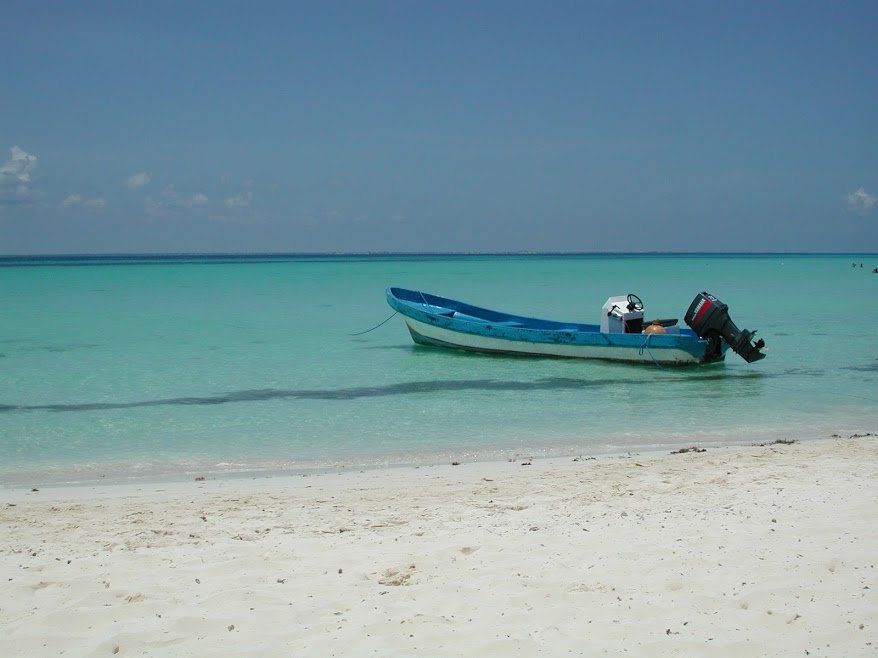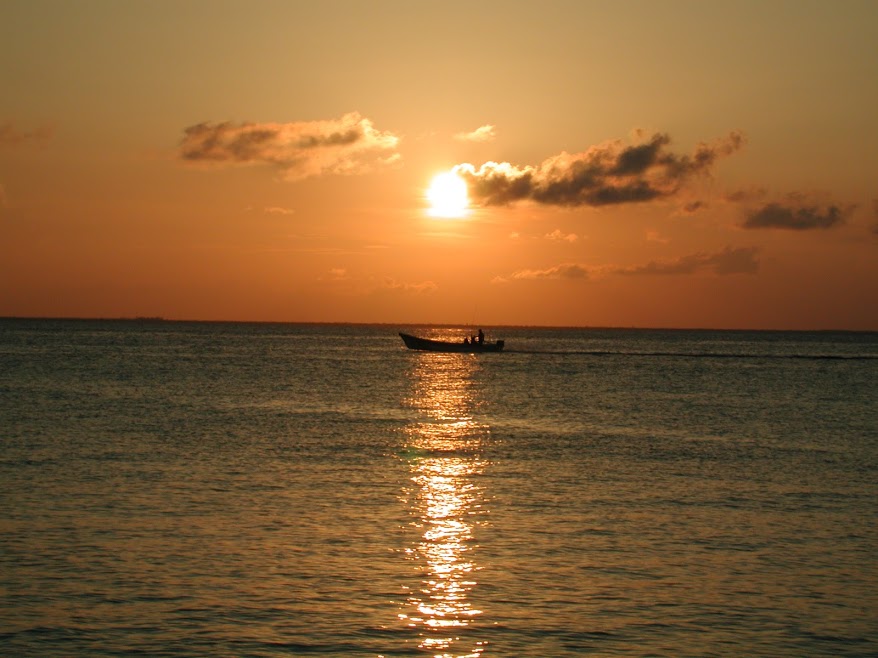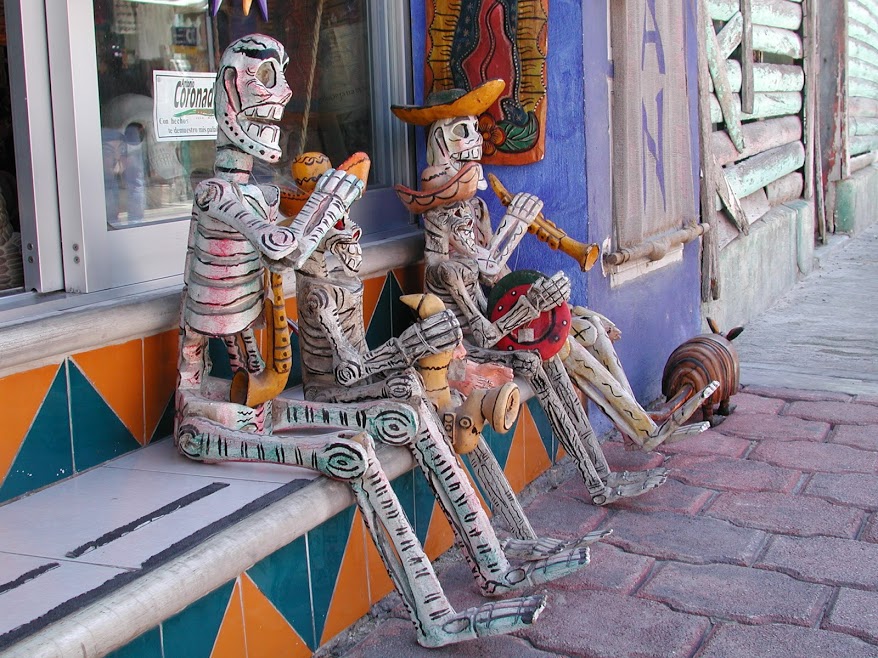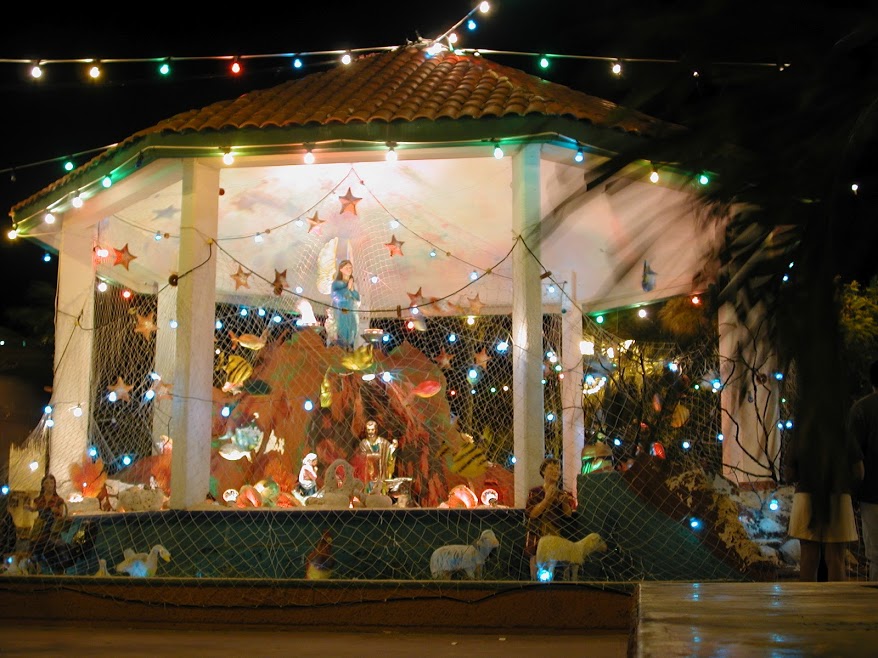Isla Mujeres, Quintana Roo, México
06 September 2001
Lo que tu eres, yo fui
Lo que yo soy, luego serás
—Inscription on the pirate Mundaca’s Tomb
Many, many years ago, a pirate by the name of Fermin Antonio Mundaca de Marechaja landed on Isla Mujeres and fell in love with a young lady whose name has been long forgotten. Today, she is known only as La Trigueña (The Brunette), the name by which he referred to her. In order to win her love, Mundaca built an elaborate hacienda, erected archways and laid paths throughout the gardens. He had trees and plants brought from all over the world to plant in the gardens. Unfortunately, before he finished this masterpiece, she ran off with another islander and got married. Today, his house lays in ruins in the middle of what remains of his fortress. And if you look carefully, you can faintly work out the words La Trigueña carved into the stone archway. Mundaca eventually died of the plague in Mérida, but his small tomb can still be seen among the headstones of the small cemetary near the north beach of town. Adorned with an eerily grinning skull and crossbones, it bears no name, but carries the inscription: ‘As you are, I was. As I am, you will be.’
With a couple weeks before school and work starts, we decided to visit Isla Mujeres (lit. The Island of Women), a small island that sits about 11 km off the east coast of the Yucatán Peninsula, in Quintana Roo. A few hours east of Mérida, the island is surrounded by the turquoise, bathtub warm, crystal clear waters of the Caribbean, and is the site of some spectacular snorkeling and diving.
Isla Mujeres is tiny—about 8 km long and between 300 and 800 metres wide—and has a population of 7000 residents. The main part of the town sits on the north-west tip of the island, but there are some smaller colonias in the central Salinas area, as well as on the south end. Although it was once a fishing town, the main business today is tourism. Unlike Cancún, however, Isla Mujeres has a much more relaxed, laid back pace of life, and it hasn’t yet turned into a party town full of drunken gringos. The locals appear to want to keep it this way, and the local San Francisco store stops selling alcohol at 8:30 or 9:00 in the evenings.

From the downtown Cancún bus station, we grabbed the Route 13 bus north along Avenida Tulum to the Puerto Juarez ferry terminal, then hopped on a boat for the 30 minute ferry ride to the island. We spent the whole ride locked in a psychological battle trying not to jump off into the gorgeous blue water; it was sheer torture. Apparently we weren’t the only ones—as soon as the boat pulled alongside the Isla Mujeres dock, one 40 year old passenger jumped overboard and swam to shore.We spent the next few days wandering around the island on foot. Like a lot of touristy places in Mexico, there are thousands of people trying to sell you anything and everything on the street. Fortunately, the city is small enough that all the hawkers seem to be packed into two blocks along Avenida Hidalgo between Av. Abasolo and Av. Lopez Mateos. Unfortunately, that’s the easiest way to get to the beach. Fortunately (yet again), it’s easily bypassed by taking the scenic route.
The best times of day for the beach are sunrise and sunset. The boatloads of tourists from Cancún aren’t there, and the beach is nearly empty. The water stays warm 24 hours a day, and the sunsets and sunrises are spectacular. During the afternoons, the beach is packed with people and the sun is intense enough that if you don’t fork over the 60 pesos ($10 Canadian) for a beach umbrella, you’ll fry like bacon, even with the SPF 50 they sell at the super market. There’s a reason most Mexicans swim in shorts and a t-shirt.
There are a lot of other things to do on the island. One of the most interesting is the Sea Turtle conservation park. This is the only facility in Mexico dedicated to preserving endangered sea turtles, such as the Hawk’s Bill Turtle, which grows to over 100 kg, and lives to around 120 years old. The sea turtles have been hunted to near extinction because of world-wide demand from for their meat and shells. At the conservation facility, the turtles are bred, cared for, then released back into the wild. There are no railings on the walkways above the huge walled off section of ocean where the largest of the turtles swim, and according to the guy who showed us around, if you fall in, ’te comen!’, ’they eat you!'.

The ruins of Mundaca’s fortress are in the central part of the island, and if you want to be eaten alive by mosquitos (there are Dengue Fever warnings all over the place on the Yucatán Peninsula, by the way) it’s a great place to go. No wonder the object of Mundaca’s affections ditched him for another man. Any sensible pirate would have built his fortress on the beach or at least within walking distance. Mundaca built his in the marshiest, grottiest, most densely jungled part of the island. On the bright side there is, however, a sort of small zoo in his gardens, with alligators, monkeys, a deer, and apparently a jaguar, though we never got to see it, because the mosquitos drove us out first. By the twentieth or thirtieth bite, we’d had more than enough of Mundaca’s place.On the south side of the island, there’s Playa Garrafón, which is part of a national park, but seems to have been recently turned into an expensive tourist trap, complete with all-you-can-eat restaurants, zip lines, ‘underwater adventure’ and more construction, all for the low, ubeatable price of $35 US a day! I believe they even translated that price into pesos underneath in small type. We actually went next door, paid 20 pesos (about $2 US) and had the whole beach to ourselves. We snorkeled around the wharf and a small reef, then Pablo and Armando, who ran the place, took us out to a reef 15 minutes out by boat, where we saw sharks, a sting ray, and a ton of live (and dead) coral. Unfortunately, it seems like a million and one other people go out to the same reef, and most don’t know how to swim. This means you’ll end up spending an hour getting your head kicked in by screaming hoardes of life-jacket wearing, water spitting drowners. I did get rammed in the legs by a nurse shark though. It felt like sandpaper and was among the creepier sensations I have experienced in my life.

There are also some Mayan ruins at the south tip of the island, though there’s very little left of them. Most of the ruins have been hurled into the ocean by various hurricanes, but what’s left sits on a small point overlooking the crystal clear blue water. My favourite part was the hand painted sign that reads ‘IGUANAS-No los tire piedras-Cuidelas’, ‘Please do not throw rocks at the iguanas-take care of them!’ Two English ladies who now live in Kentucky were kind enough to pick us up on their rented golf cart and haul us back into town, saving us a taxi ride/sunburn.During our stay on the island, we ran into a small herd of beach cats. They appeared to be completely starving, which I’m sure is all part of their little ploy to get food from unsuspecting tourists. In fact, I’m sure that if a study were done, they’d probably find that this is a behaviour that beach cats have evolved over centuries of tourism, sort of like pigeons that pretend to be one-legged to get sympathy points from old grannies in parks. In any case, these poor things ended up rounding up enough sympathy to get some canned tuna… twice. Most of the time, though, I we watched it digging holes on the beach, which I don’t really want to think about too much. We also saw it kill and eat cockroaches, which no matter how disgusting it is, I have to admit is actually sort of mezmerising.
All in all, it was a great vacation before everything gets crazy here. We hope we’ll have time to go back at some point for another visit. The place to stay is definitely the Hotel El Marcianito; the guy who runs it is totally friendly, and gave us a ton of advice on places to see.